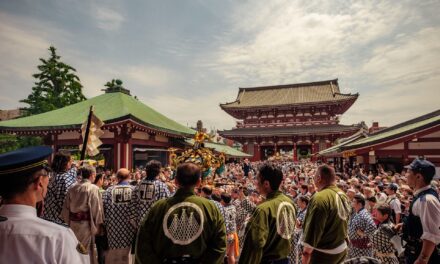When it comes to travelling, safety may often be overlooked by people.
This is apparent in safe countries such as Singapore, New Zealand and Denmark as crime rates are generally low in these countries.
Japan is known for being one of the safest countries in the world.
According to the 2022 Global Peace Index by VisionofHumanity, Japan is ranked 10th in the Safest Countries in the World 2023 list – closely ranked with Singapore.

Despite its high population density and urbanization, Japan has a remarkably low crime rate.
So this begs the question: “What makes Japan so safe compared to other countries?”
Table of Contents
Here are various reasons why Japan is a safe country to visit.
Historical context
Japan’s feudal period and the development of social order
The feudal period in Japan lasted from the 12th century until the 19th century.
During this time, social order was maintained through a strict hierarchical system that emphasized loyalty and obligation to one’s superiors.
Hierarchy is deeply embedded into the Japanese culture and it is still evident in modern times.
They are consistently mindful of the people around them to ensure that they are not offending anyone who is above their ranks.
Learning from their Western Counterparts
In the late 19th century, Japan underwent a period of modernization known as the Meiji Restoration.
In the past, Japan had many violent crimes and civil wars happening- crime rates were escalating and the Japanese government had to find solutions.
As part of this process, the government introduced a new policing system modelled after Western countries, which emphasized crime prevention and public safety.
In 1873, the Japanese government studied the policing systems of various European countries such as Italy, Prussia and France.
Thereafter, they would implement their findings into the Japanese policing system, resulting in better security and lower crime rates.
Japan’s lessons from the War
Japan’s involvement in World War II and its subsequent defeat led to a shift in the country’s approach to safety and security.
The government placed greater emphasis on maintaining social order and preventing crime, which has contributed to Japan’s low crime rate.
Culture of Collectivism

Japan’s emphasis on respect for authority and social harmony
Japanese culture places great value on respect for authority and maintaining social harmony.
The Japanese were taught from a young age to always be cooperative and mindful of their surrounding, establishing collectivist ideals in them from a young age.
Certain behaviours such as compulsiveness and assertiveness tend to be frowned upon and seen as ‘immature’ by the general populace.
This emphasis on group cohesion and cooperation helps to prevent the type of individualistic behaviour that usually lead to crime.
The role of shame in Japanese society
In Japanese culture, public shame is a powerful deterrent to criminal behaviour.
Offenders risk bringing shame not only on themselves but also on their families and communities, which serves as a powerful disincentive to commit crimes.
As the Japanese were brought up with a collectivistic culture, social pressure can be heavy on the people who don’t follow the status quo – which includes following the law.
Even if a person commits a misdemeanour, the shame would be overwhelming to the person who has committed the crime.
This forces people to think twice before committing any inappropriate acts.
The influence of Confucianism and other philosophical traditions
Japan’s culture of respect can be traced back to its philosophical traditions, such as Confucianism, which emphasizes social order, hierarchy, and respect for authority.
As these ideals are incorporated into their education system, it has been conditioned in their minds from a young age.
Effective Policing

Japan’s community-oriented approach to policing
The police in Japan are deeply embedded in their communities and work closely with local residents to prevent crime.
There are many interactions between the police force and the residents, and you would find notices on community boards to keep everyone up-to-date.
This community-oriented approach fosters trust between police and citizens and enables police to identify potential problems before they escalate into more serious crimes.
The role of the police in maintaining social order
The police in Japan are responsible not only for enforcing the law but also for maintaining social order.
They work closely with other government agencies and community organizations to address social issues that can lead to crime, such as poverty, unemployment, and homelessness.
This gives more authority to the police and the citizens of Japan often listen to the police without any resistance.
The effectiveness of Japan’s criminal justice system
Japan’s criminal justice system is known for its efficiency and high conviction rates.
The system emphasizes rehabilitation and reintegration into society, rather than punishment, which has helped to reduce recidivism rates and contribute to the country’s low crime rate.
Disaster Preparedness

Another part of safety that is often overlooked would be Disaster preparedness.
We often associate a country’s safety with its crime rate, but disaster preparedness should also be included in consideration when you’re travelling.
Japan’s experience with natural disasters
Japan is prone to earthquakes, typhoons, and other natural disasters.
These issues force the Japanese government to enforce measures such as ensuring that all buildings can withstand the shocks of earthquakes and typhoons.
The government and local communities have developed a culture of preparedness to minimize the impact of these events and ensure the safety of their citizens.
There can find many Youtubers who have demonstrated these disaster preparedness exercises.
The role of government and community organizations in disaster preparedness
The government and local communities work closely together to develop disaster preparedness plans and conduct regular drills to ensure that they are ready to respond in the event of a disaster.
Community organizations play a key role in this process by providing support and assistance to those in need.
Lessons from Japan’s disaster response and recovery efforts
Japan’s experience with natural disasters has taught valuable lessons about disaster response and recovery.
The country has developed innovative technologies and strategies for disaster prevention and response, which can be applied in other countries facing similar challenges.
During the time of emergency, televisions and smartphones will receive an automated update about the impending disaster.
Conclusion
All in all, Japan’s safety can be attributed to a combination of factors, including its historical context, collectivist mindset, effective policing, and disaster preparedness.
When you’re travelling to Japan, you can rest assured that you’re in a safe environment.
As usual, even if Japan has a low crime rate and is generally safe, it is always prudent to be vigilant at all times.
- Have you ever felt unsafe in Japan before?
Tell us your experience in the comment section below! We would love to hear your stories. Share this article with your friends who are travelling to Japan!










